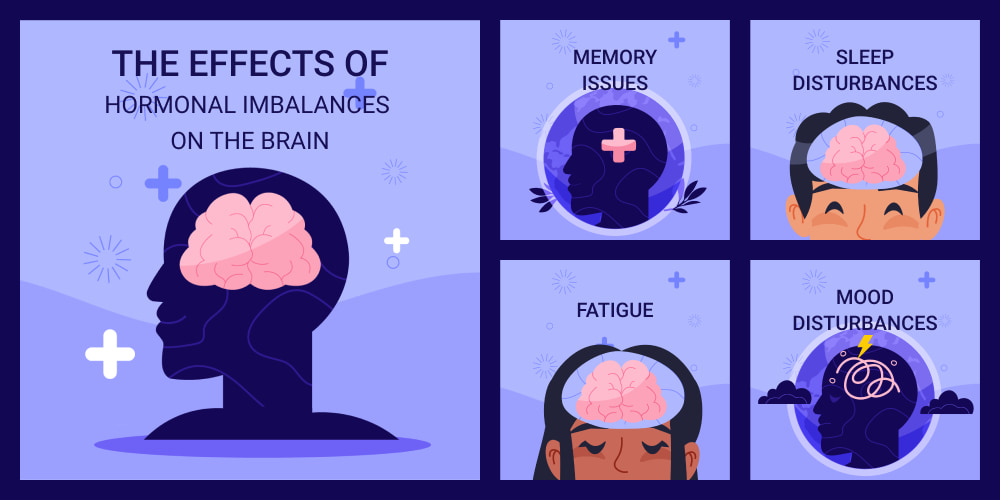Human health is delicate and can be easily disrupted. Mental health is also particularly delicate. Many factors influence it. Hormonal imbalances are among them. Hormonal imbalances can lead to various health conditions. They are sometimes unbearable. Often, people do not know who to turn to and how to deal with them. We will answer all questions in detail. Our team prepared all the essential information.
We will explore the connection between hormonal imbalance and neurological health. This knowledge will help you to have an understanding of common diseases. You will also understand the functioning of the most critical human systems. We will provide invaluable information and modern treatment strategies. Thousands of recovered patients have proved their effectiveness. This is important to exploring all nuances. So you will prevent severe disorders. You will also keep your health stable and excellent. So, let’s get started!
The Effects of Hormonal Imbalances on the Brain
Hormones can influence both innate characteristics and personality traits. Thanks to advances in neuroscience, there is now an understanding of how this influence occurs. We have also been able to understand which hormones play a key role. There are some of the key effects of hormonal imbalances on the brain:
- Cognitive dysfunction: Hormonal fluctuations can impair concentration, attention, and clarity. This makes it difficult to focus or process information efficiently.
- Memory issues: Low levels of estrogen or thyroid hormones can lead to forgetfulness. It also causes difficulty recalling information and reduced memory retention.
- Mood disturbances: Imbalances in serotonin, dopamine, and cortisol are dangerous. They usually cause depression. These imbalances may also cause anxiety, irritability, and even mood swings.
- Fatigue: Hormonal disruptions can lead to persistent tiredness. It affects mental alertness and brain function.
- Sleep disturbances: Imbalanced hormones can cause insomnia or poor-quality sleep. This, in turn, affects brain health and cognitive performance.
Recognizing these effects prevents further damage to neurological health and hormonal imbalance. Timely intervention and treatment can help restore balance. It improves cognitive function and emotional stability. Addressing hormonal imbalance is, therefore, crucial for maintaining optimal brain health.
Hormonal Fluctuations and Mental Health
Hormonal changes can have a profound impact on psychological health. Imbalances caused by these changes often lead to significant mood shifts. They can also cause emotional instability. Hormones directly influence neurotransmitter activity in the brain. Even subtle changes can affect how the nervous system functions.
There are common signs and disorders linked to hormonal fluctuations and mental health:
- Anxiety: Changes in cortisol or serotonin levels can contribute to feelings of constant worry. They may also cause nervousness.
- Depression: A drop in estrogen or progesterone appears during menstruation or menopause. It is often associated with depressive symptoms.
- Irritability and mood swings: Hormonal changes appear, especially during PMS or menopause. They can lead to heightened irritability and unpredictable mood swings.
- Fatigue: Hormonal shifts can cause tiredness and low energy levels. It often leads to a decrease in motivation and mental clarity.
Understanding hormonal fluctuations and mental health is crucial. It manages the impacts of hormonal imbalances on the brain. Timely intervention can help mitigate these mental health challenges.
How Hormones Affect the Nervous System
Cortisol and adrenaline have a direct impact on the nervous system. It influences its functions and responses. Cortisol, the stress hormone, is typically released during stressful situations. It prepares the body for immediate action. However, prolonged elevated cortisol levels can lead to overstimulation of the nervous system. It results in anxiety, irritability, and difficulty concentrating.
Similarly, adrenaline is generally released during the “fight or flight” response. It increases alertness and physical readiness. This is helpful in short bursts. Chronic high adrenaline can cause heightened stress and nervous system dysfunction.
We explore how hormones affect the nervous system. Disruptions in its levels can lead to a variety of disorders:
- Panic Attacks: Due to elevated cortisol or adrenaline.
- Depression: Hormonal imbalances can impact neurotransmitter function. It leads to feelings of sadness or hopelessness.
- Cognitive Decline: Prolonged imbalances can affect memory. It also impacts focus and cognitive clarity.
- Sleep Disturbances: Imbalanced hormones can interfere with the ability to fall or stay asleep. They affect overall mental health.
Understanding how hormones affect the nervous system is essential. It helps address these imbalances and promote neurological well-being.
The Role of the Endocrine System in Neurological Disorders
The endocrine system is critical in regulating hormone levels throughout the body. It influences many physiological processes, including metabolism, growth, mood regulation, and reproductive health. This system comprises the thyroid, adrenal glands, and pituitary. Each of them secretes hormones that travel through the bloodstream to target organs. They include the brain. When this system functions properly, it maintains a delicate balance. It is necessary for optimal health. Dysfunctions within the endocrine system can lead to significant neurological disorders.
Imbalances in cortisol, thyroid hormones, and estrogen can have direct effects on mental health:
- Anxiety: Elevated cortisol levels, often resulting from chronic stress. It can overstimulate the brain. This leads to anxiety and heightened stress responses.
- Depression: Low levels of thyroid hormones or imbalances in estrogen and progesterone. They can contribute to feelings of depression and mood swings.
- Cognitive decline: A dysfunction in thyroid hormone production can lead to mental impairments. They include memory problems and difficulty concentrating. Some individuals experience chemotherapy-related cognitive impairment.
- Fatigue and irritability: Hormonal imbalances can result in persistent fatigue and mood swings. They also lead to irritability. It often leads to further mental health struggles.
These neurological disorders impacting the endocrine system can worsen over time. This occurs when left untreated. It leads to chronic conditions that interfere with daily life and overall well-being. Recognizing and addressing hormonal imbalances early is vital. It prevents the progression of these issues. Prompt treatment can help restore balance in the endocrine system. It ultimately improves mental health and reduces the risk of long-term neurological complications.
The Impact of Thyroid Imbalance on Brain Function
Hypothyroidism and hyperthyroidism have a profound impact of thyroid imbalance on brain function. The gland produces hormones that regulate metabolism, energy levels, and body function. They include brain activity. These hormones may be either underproduced (hypothyroidism) or overproduced (hyperthyroidism). The effects on the brain can be significant.
Let’s explore the symptoms of thyroid imbalance:
- Fatigue: Hypothyroidism and hyperthyroidism can cause severe fatigue. This happens for different reasons. Hypothyroidism leads to a sluggish metabolism. Hyperthyroidism increases energy expenditure. These can result in mental exhaustion.
- Memory Issues: People with thyroid imbalances often experience forgetfulness. They face difficulty concentrating and brain fog. It happens mainly in hypothyroidism. There, cognitive processing slows down.
- Mood Swings: Hormonal changes can cause significant emotional instability. Hypothyroidism is generally linked to depression and irritability. Hyperthyroidism may lead to anxiety and nervousness.
- Slowed Thinking or Hyperactivity: Thinking can become slow and sluggish. Hyperthyroidism may cause racing thoughts and restlessness.
There are treatments for the effects of hormonal imbalances on the brain:
- Medication: The most common treatment for hypothyroidism is thyroid hormone replacement therapy (levothyroxine). It helps normalize hormone levels and restore brain function. For hyperthyroidism, methimazole or beta-blockers are necessary. They manage symptoms.
- Dietary Adjustments: Ensuring adequate intake of iodine, selenium, and zinc is essential. It can support thyroid health and reduce symptoms of imbalance. Avoiding excessive soy or goitrogens can also help in some cases.
- Lifestyle Modifications: Regular exercise and stress management techniques are crucial. They are mindfulness and yoga. Such techniques can help mitigate the effects of thyroid dysfunction on brain health.
Correcting thyroid imbalances’ impact of thyroid imbalance on brain function is essential. It restores cognitive clarity and emotional stability.
Estrogen and Its Effects on the Brain
Estrogen levels influence cognitive function, mood, and neurological health. This is particularly significant in women. The connection between estrogen and common neurological conditions is memory loss and mental fog. Let’s explore treatment options for balancing estrogen levels:
- Mood Regulation: Estrogen and its effects on the brain are strong. It influences the production of serotonin and dopamine. They impact mood. Low levels can contribute to anxiety, depression, and irritability. Hormonal fluctuations occur during premenstrual syndrome (PMS) and postpartum periods. They often affect women’s emotional state.
- Cognitive Function: Estrogen is crucial in memory formation and learning ability. It enhances synaptic connections in the brain. Estrogen promotes neuroplasticity. It helps the brain adapt and process information efficiently. Declining estrogen levels, especially during menopause, can lead to mental fog.
- Connection to Neurological Conditions: Memory loss and mental fog can indicate estrogen deficiency. It highlights estrogen and its effects on the brain. Women with low estrogen levels may experience reduced brain activity in certain areas. They are generally related to memory and problem-solving. There is a correlation between estrogen levels and the onset of Parkinson’s and Alzheimer’s disease.
- Treatment Options for Balancing Estrogen Levels: Hormone replacement therapy (HRT) helps restore it. It eases cognitive and mood-related symptoms. Lifestyle changes are a balanced diet, regular exercise, and stress management. These techniques support healthy hormone levels. Phytoestrogens from soy, flaxseeds, and legumes offer natural estrogen-like benefits. Medications and supplements promote hormonal stability. They are vitamin D and omega-3 fatty acids.
As you can see, hormonal balance involves multiple factors. The optimal treatment depends on each individual’s specific needs. Are you seeking professional treatment? Contact us.













Please, leave your review
Write a comment: